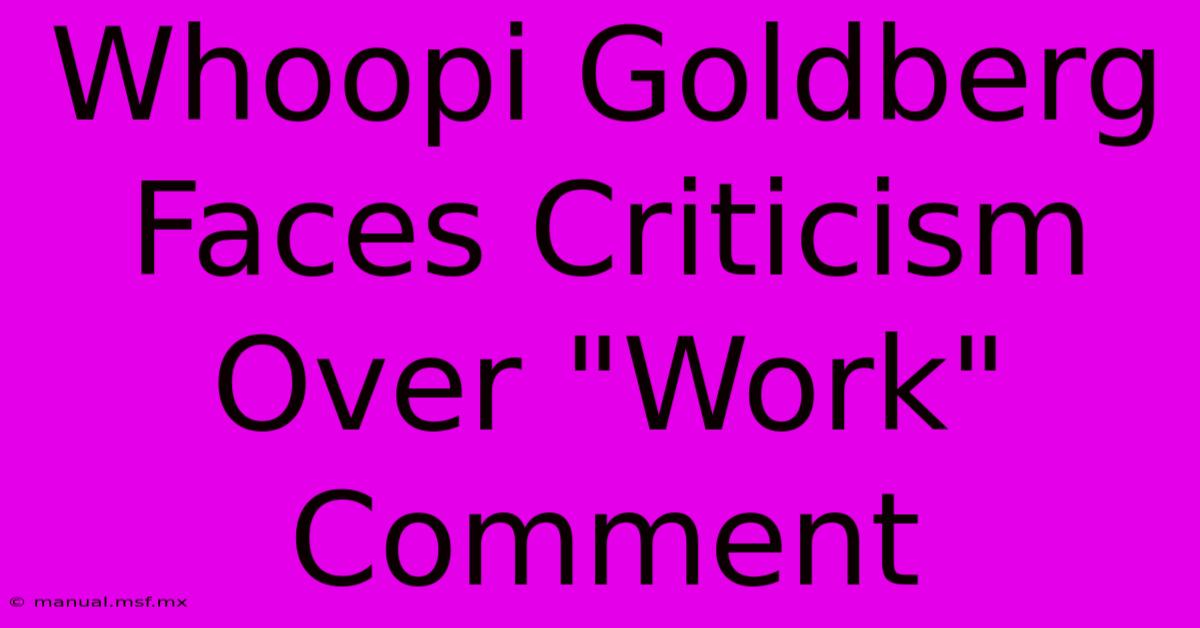Whoopi Goldberg Faces Criticism Over "Work" Comment

Discover more detailed and exciting information on our website. Click the link below to start your adventure: Visit Best Website. Don't miss out!
Table of Contents
Whoopi Goldberg Faces Criticism Over "Work" Comment: Unpacking the Controversy
Can a statement about "work" spark such a widespread debate? Absolutely. Whoopi Goldberg's recent remarks about the nature of "work" have ignited a firestorm of criticism, raising questions about her perspective and its potential impact on marginalized communities. This article explores the controversy surrounding Whoopi's comments, examining the key arguments, analyzing its impact, and considering the broader implications.
Why is this topic important? Whoopi Goldberg is a prominent figure in entertainment and her words carry significant weight. Her comments about "work" have sparked a necessary discussion about privilege, social responsibility, and the perception of labor in modern society. This debate highlights the complex interplay of race, class, and gender in the workplace and raises critical questions about equality and fairness.
Our analysis: To delve into this controversy, we examined various news articles, social media discussions, and expert opinions. We have compiled a comprehensive overview of the key arguments, considering both sides of the debate.
Key Takeaways:
| Key Aspect | Description |
|---|---|
| Goldberg's Statement | Goldberg, during a discussion about the definition of work, stated that “work” is “what you’re assigned to do.” This comment sparked immediate backlash. |
| The Backlash | Critics argue that Goldberg's statement ignores the realities of systemic inequalities and the inherent value of diverse forms of labor, particularly for marginalized communities. They emphasize the need for acknowledging the struggles faced by many, especially those who work multiple jobs, juggle childcare responsibilities, or lack access to opportunities. |
| Defense of Goldberg | Supporters point to Goldberg's history of activism and her intention to highlight the complexities of work in a capitalist society. They argue that her comment was taken out of context and misinterpreted, and that her overall message focused on the importance of finding fulfillment in one's chosen path, regardless of its social label. |
Understanding the Controversy:
Goldberg's Statement: Goldberg's comment suggests a particular view of work that is often associated with professional and managerial roles. This perception can be problematic as it overlooks the value of various types of labor, particularly those that are traditionally considered less prestigious or less skilled.
The Backlash: The criticism surrounding Goldberg's remarks highlights the widespread concern about societal perceptions of labor. Critics emphasize that "work" encompasses a vast array of activities, from manual labor to creative endeavors, and each deserves recognition and respect. They also raise concerns about the perpetuation of harmful stereotypes and the potential for this comment to undermine the struggles faced by marginalized communities.
Defense of Goldberg: Supporters of Goldberg argue that her comment was a simplistic statement about the subjective nature of work. They believe her intention was to highlight the importance of finding meaning and fulfillment in one's chosen path, regardless of societal expectations.
Looking Beyond the Controversy:
The controversy surrounding Whoopi Goldberg's "work" comment offers an important opportunity to reflect on the broader implications of labor in society. It is crucial to engage in discussions that acknowledge the diverse experiences of workers, the inherent value of all forms of labor, and the need for equitable and inclusive workplaces.
By unpacking the different perspectives, we can move beyond simplistic interpretations and engage in a meaningful dialogue about the complexities of work, its social meaning, and its impact on individuals and communities.

Thank you for visiting our website wich cover about Whoopi Goldberg Faces Criticism Over "Work" Comment. We hope the information provided has been useful to you. Feel free to contact us if you have any questions or need further assistance. See you next time and dont miss to bookmark.
Also read the following articles
| Article Title | Date |
|---|---|
| Llamada Internacional Cristina Kirchner Obtiene Apoyo | Nov 14, 2024 |
| Chaumont Verliest In De Champions League | Nov 14, 2024 |
| Torino Alcaraz Sconfigge Rublev Alle Finals | Nov 14, 2024 |
| Fc St Pauli Robert Wagner Verletzungsbedingt Ausgewechselt | Nov 14, 2024 |
| John Krasinskis Stylist Sexiest Man | Nov 14, 2024 |
| Grizzlies Lakers Game Final Score | Nov 14, 2024 |
| Raser Prozess Versuch Polizeiauto Zu Rammen | Nov 14, 2024 |
| Standbeeld Kabouter Wesley Bewegende Piemel | Nov 14, 2024 |
| Jogo Ao Vivo Flamengo X Atletico Mg Serie A | Nov 14, 2024 |
| Alcaraz Trionfa Batte Rublev Alle Atp Finals | Nov 14, 2024 |
